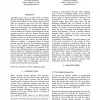Free Online Productivity Tools
i2Speak
i2Symbol
i2OCR
iTex2Img
iWeb2Print
iWeb2Shot
i2Type
iPdf2Split
iPdf2Merge
i2Bopomofo
i2Arabic
i2Style
i2Image
i2PDF
iLatex2Rtf
Sci2ools
101
click to vote
ISMIR
2004
Springer
2004
Springer
Disambiguating Music Emotion Using Software Agents
Annotating music poses a cognitive load on listeners and this potentially interferes with the emotions being reported. One solution is to let software agents learn to make the annotator’s task easier and more efficient. Emo is a music annotation prototype that combines inputs from both human and software agents to better study human listening. A compositional theory of musical meaning provides the overall heuristics for the annotation process, with the listener drawing upon different influences such as acoustics, lyrics and cultural metadata to focus on a specific musical mood. Software agents track the way these choices are made from the influences available. A functional theory of human emotion provides the basis for introducing necessary bias into the machine learning agents. Conflicting positive and negative emotions can be separated on the basis of their different function (reward-approach and threat-avoidance) or dysfunction (psychotic). Negative emotions have strong ambiguity...
Related Content
| Added | 02 Jul 2010 |
| Updated | 02 Jul 2010 |
| Type | Conference |
| Year | 2004 |
| Where | ISMIR |
| Authors | Dan Yang, WonSook Lee |
Comments (0)

